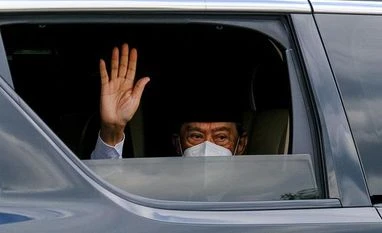Malaysian Prime Minister Muhyiddin Yassin and his cabinet resigned after more than 17 months in power, fueling a crisis of leadership in a country beset by a weakened economy and a surge in coronavirus cases.
Muhyiddin, 74, will stay on as a caretaker prime minister until a successor is named, the palace said in a statement on Monday after he met with the country’s king earlier in the day. The king had accepted his resignation and said a fresh election is not the best option during a pandemic.
Confirmation of the resignations first surfaced on an Instagram story posted by Science, Technology and Innovation Minister Khairy Jamaluddin. The palace made the official announcement before Muhyiddin addressed the country, signaling how strained ties had become and marking an end to an administration that has been beset by repeated demands from opposition lawmakers and coalition allies to step down.
“I led the country in a state of unprecedented health and economic crises. At the same time I continued to face political threats,” Muhyiddin said on national television, striking a defiant tone. “I will never conspire with kleptocratic groups, interfere with the independence of the judiciary nor turn my back on the Federal Constitution simply to stay in power.”
Muhyiddin has resisted calls to step down since taking office in March 2020. He announced on Aug. 4 that he would finally hold a confidence vote in parliament next month, and last week he appealed on national television to opposition lawmakers to support a slew of reforms before he calls a general election by July 2022 -- a proposal that was quickly rejected.
Parliamentary Confidence
Under constitutional law, any lawmaker who can command a majority in parliament can stake a claim to form the government, and the king needs to give his assent to formalize the appointment.
Media reports have speculated that Deputy Prime Minister Ismail Sabri Yaakob and veteran politician Tengku Razaleigh Hamzah, both from UMNO, are in consideration for the premiership. If true, that suggests the party that ruled Malaysia for decades could have a chance of regaining control of the government after losing elections in 2018 over an unpopular consumption tax and a scandal involving billions of dollars siphoned from state investment firm 1MDB.
While UMNO has a good chance of consolidating its position by bringing its pro-Muhyiddin lawmakers back into the fold, it will have to placate existing coalition partners and build a simple parliamentary majority of 111 seats out of 220. To do this, UMNO needs support from an Muslim-centric party and Muhyiddin’s Bersatu with offers that could include cabinet positions.
UMNO also needs to win over several east Malaysian parties and ensure that some disgruntled Bersatu lawmakers don’t return to the opposition led by Anwar Ibrahim, which currently holds 89 seats.
“Ultimately, these issues are not going to resolve till the election is held and even an election may not necessarily solve those problems,” said Bridget Welsh, Honorary Research Associate with the University of Nottingham Asia Research Institute Malaysia. “You have a fragmented political elite system and that system, as well as the parties themselves, need reform.”
Economy Flagging
The uncertainty in appointing a new premier and forming yet another government may worsen the pressure on Malaysian assets, which are already struggling under the weight of the virus outbreak and the prospect of a reduction in U.S. stimulus.
“Malaysia’s domestic political situation remains highly uncertain, and the Covid outbreak shows no sign of flagging,” said Alvin Tan, head of Asia currency strategy at RBC Capital Markets LLC in Hong Kong. “So I would remain very cautious on MYR in the near-term until there are indications that power will be transferred to a new viable government, plus signs that the current Covid-19outbreak has peaked.”
The main equities gauge, which is among the worst performers in the region this year, narrowed losses of as much as 0.7%. The ringgit briefly touched the weakest in over a year before paring losses to trade little changed versus the dollar
Muhyiddin, who became prime minister after a power struggle following Mahathir Mohamad’s sudden resignation last year, had tried to wield control at the start of 2021 by declaring a state of emergency and suspending parliament. He cited the pandemic as a reason and obtained the king’s consent, yet infections surged and the economy struggled over conflicting government directives.
Last week, Malaysia’s central bank cut its 2021 economic growth forecast for a second time, as renewed movement restrictions and rising Covid-19 infections hamper the recovery. The economy shrank 2% in the second quarter from the first, cutting short a brief uptick and prompting officials to unveil plans over the weekend to ease restrictions on the retail and manufacturing sectors.
“Muhyiddin never stood a chance because he had two fatal flaws,” said James Chin, a political analyst and a director of the Asia Institute at the University of Tasmania in Australia. “First, he was never able to control UMNO, the biggest party in his coalition. Second, he was never able to control Covid-19 despite advanced warning.
Unlock 30+ premium stories daily hand-picked by our editors, across devices on browser and app.
Pick your 5 favourite companies, get a daily email with all news updates on them.
Full access to our intuitive epaper - clip, save, share articles from any device; newspaper archives from 2006.
Preferential invites to Business Standard events.
Curated newsletters on markets, personal finance, policy & politics, start-ups, technology, and more.
)